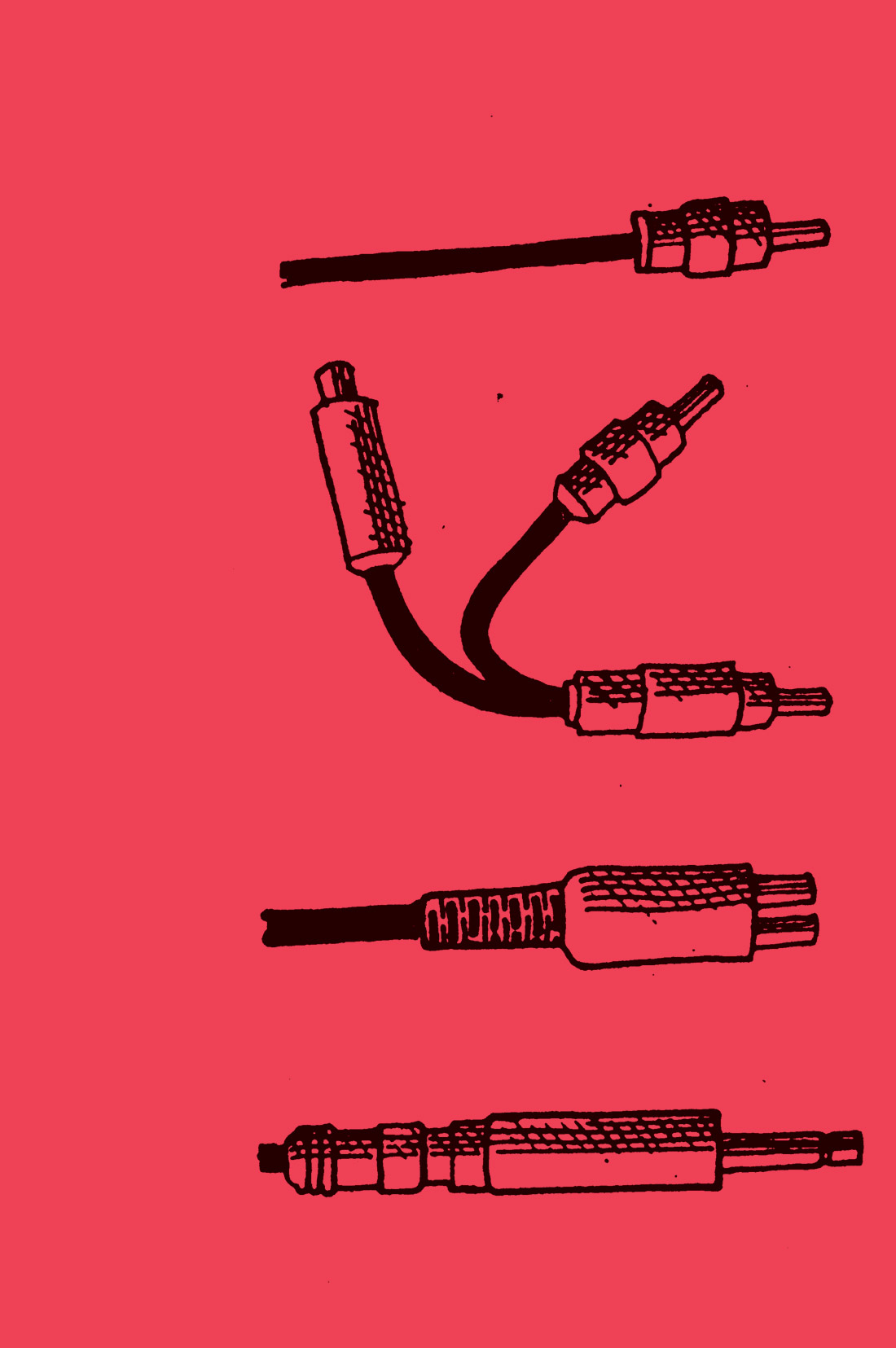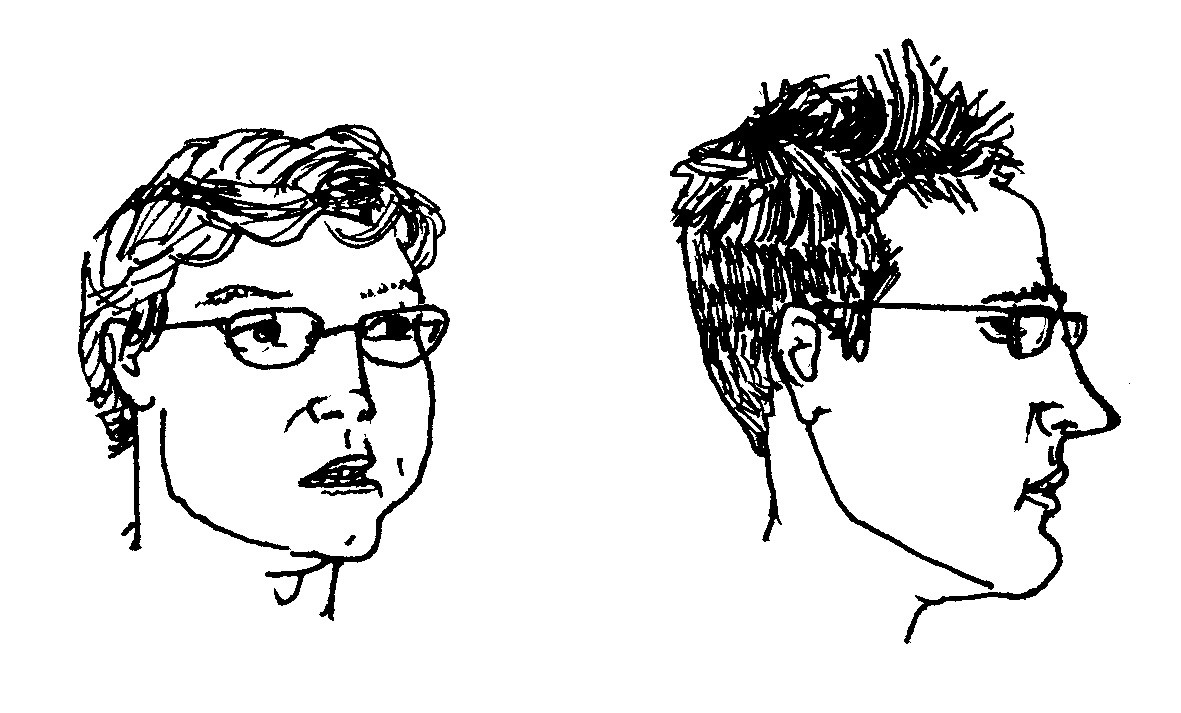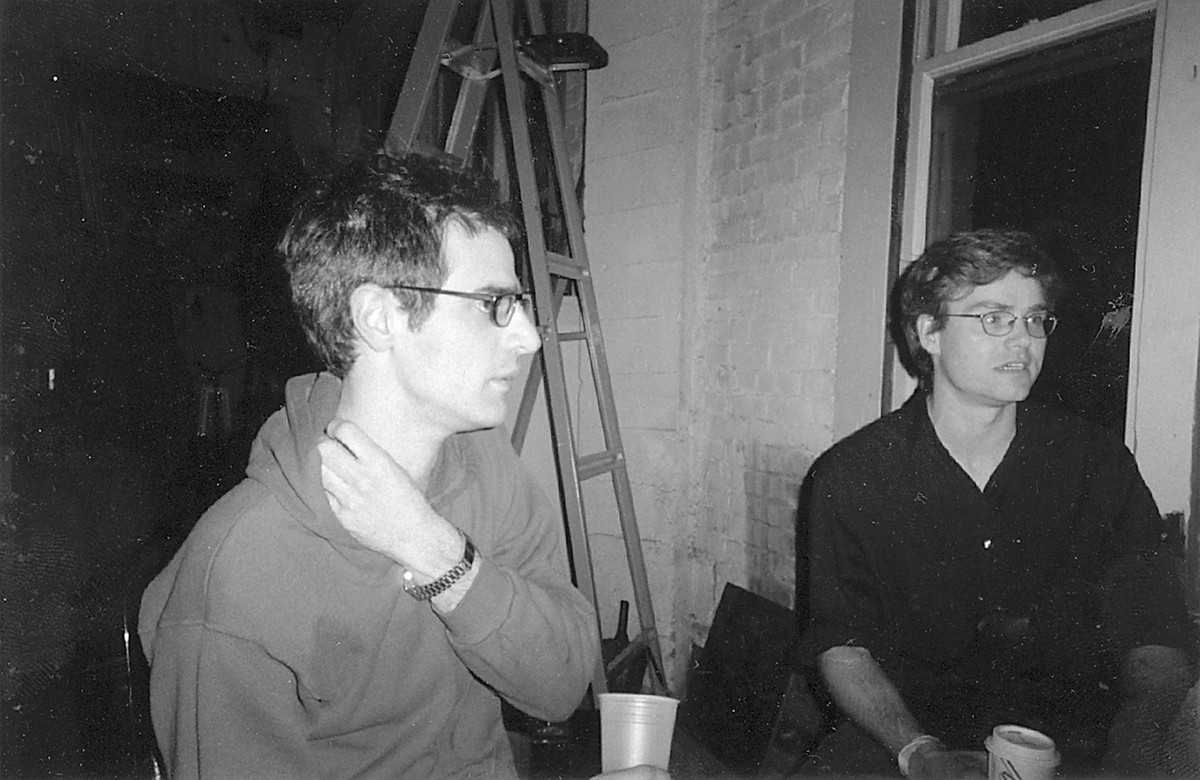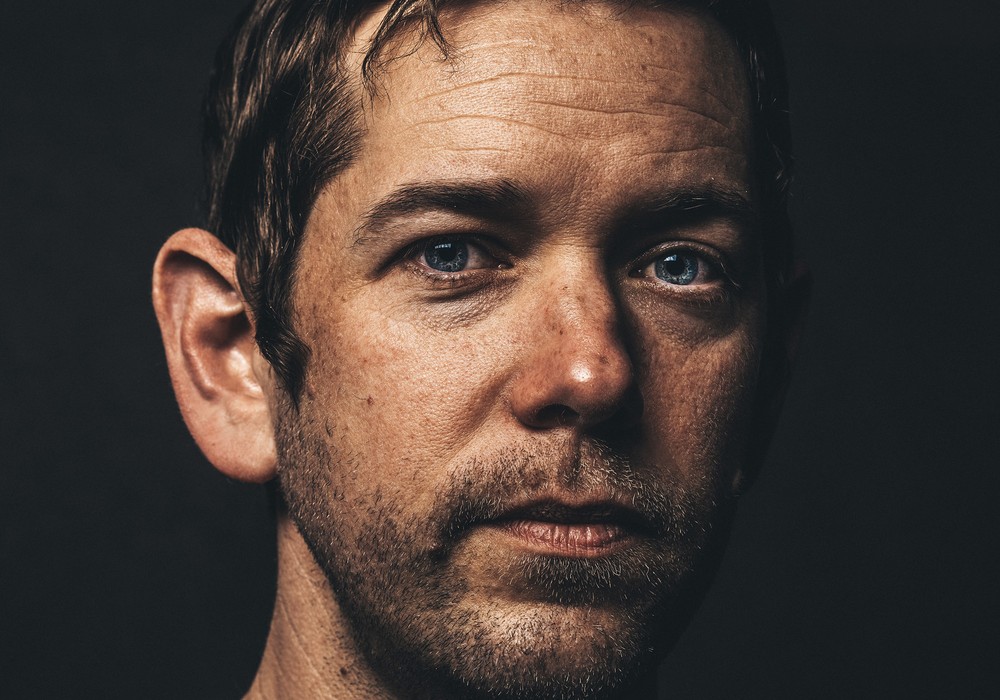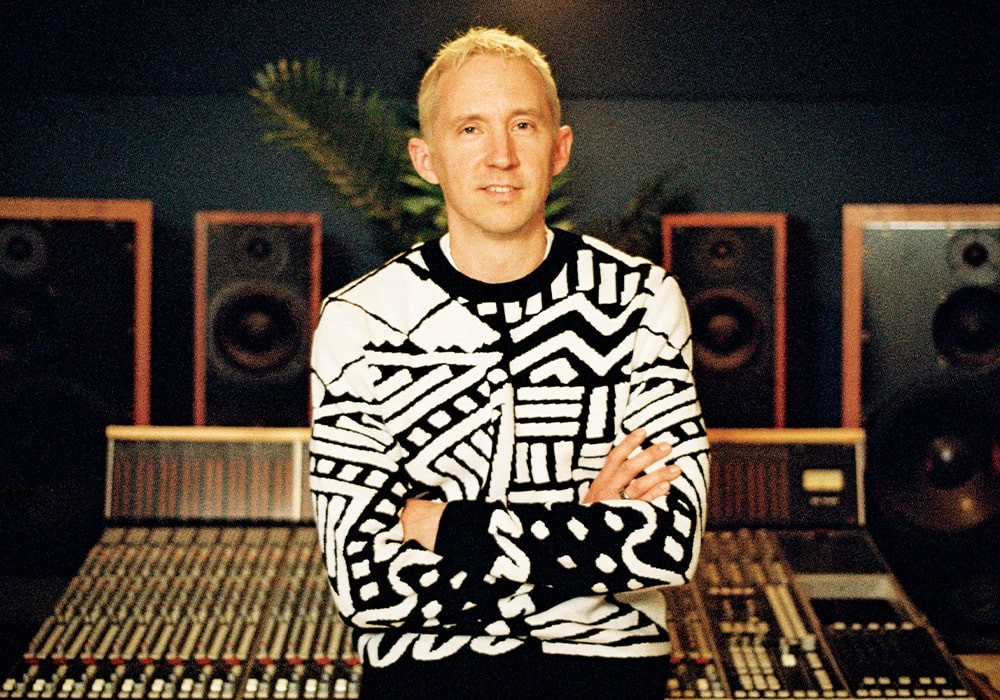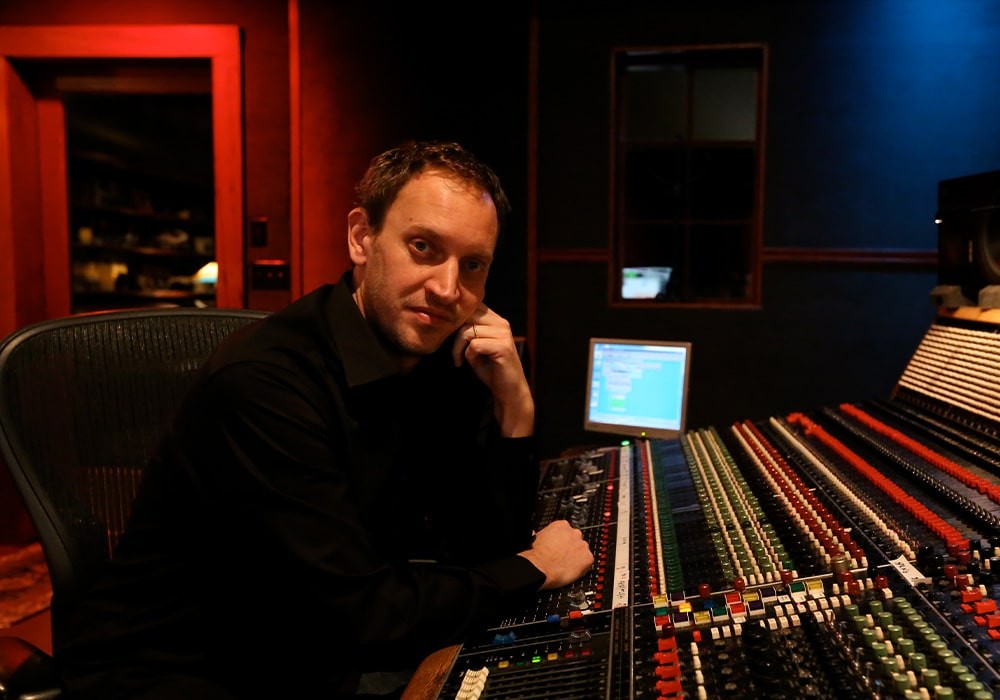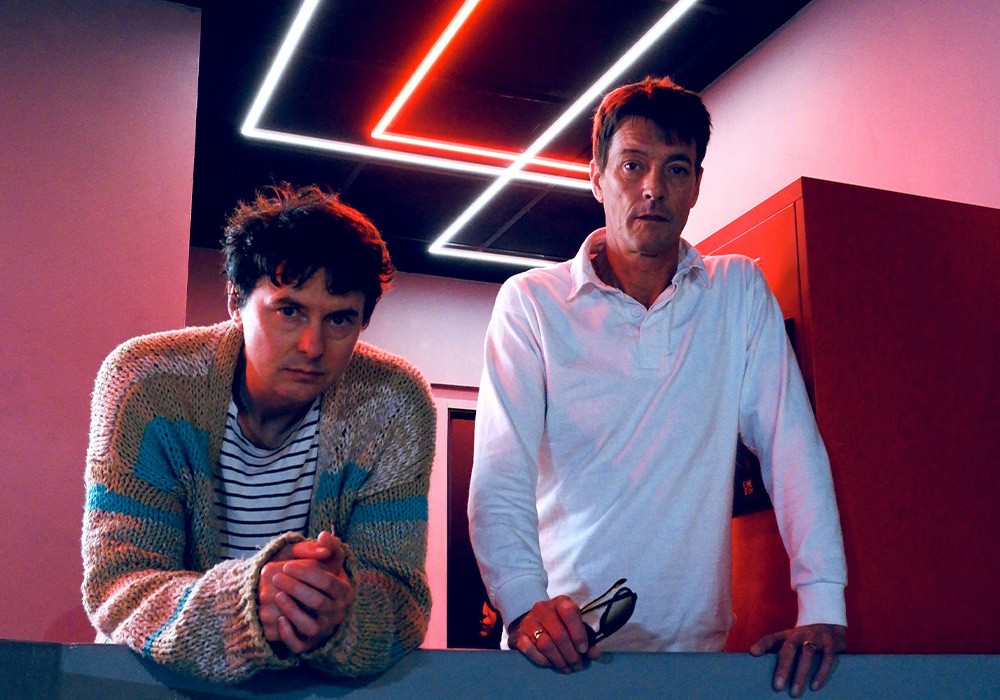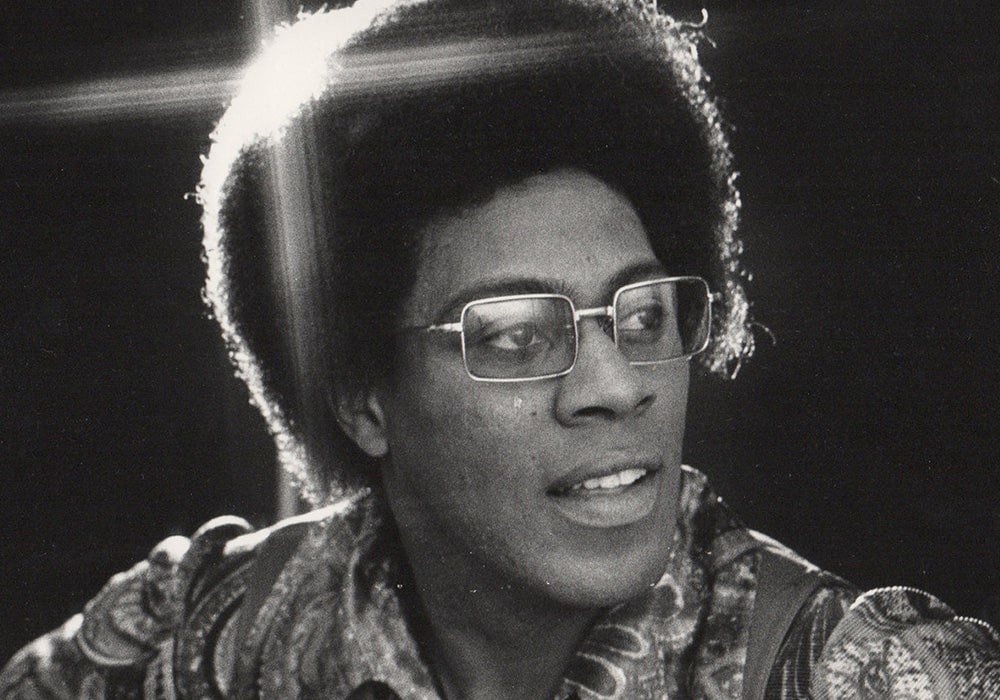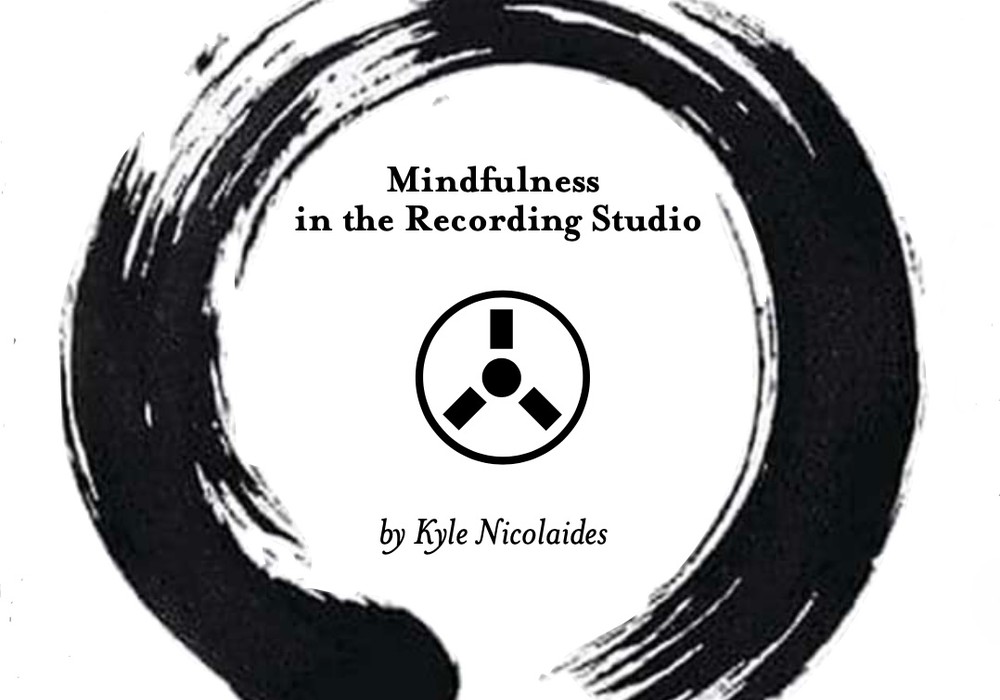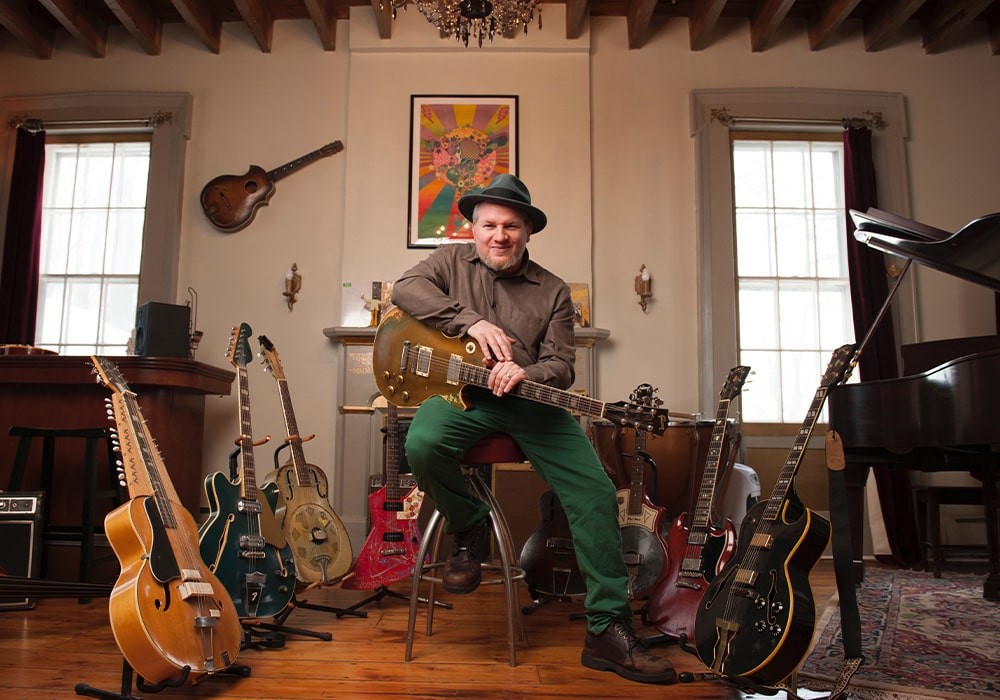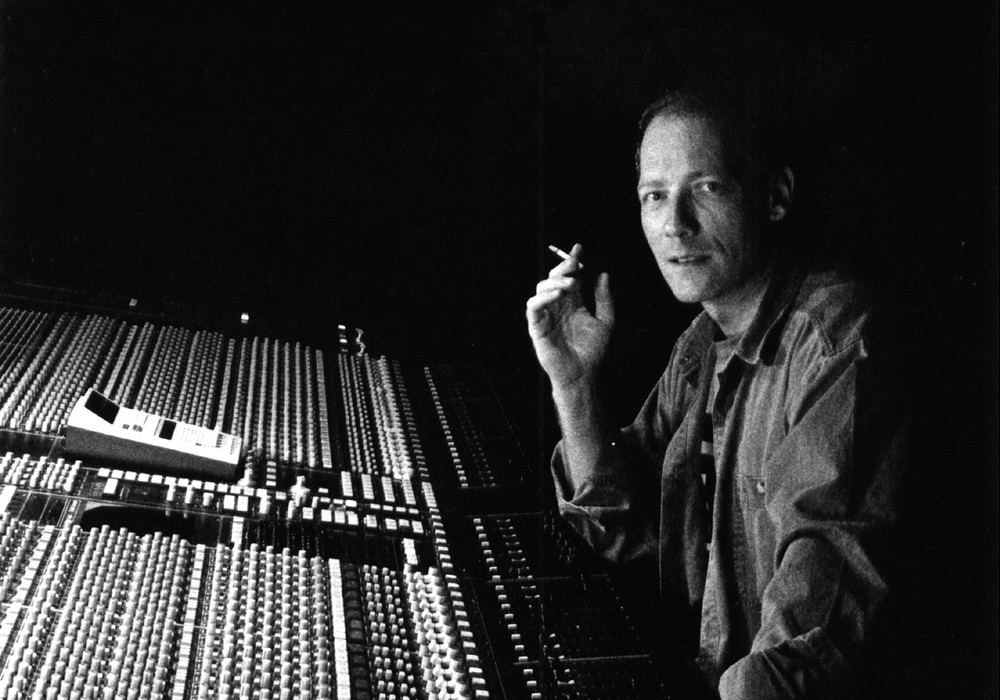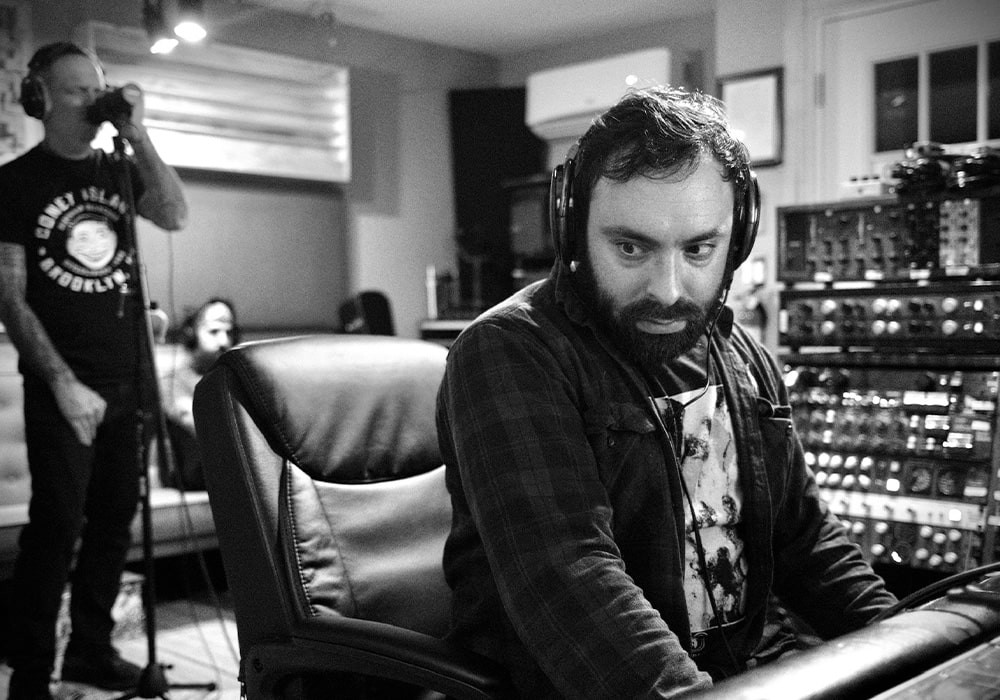Fugazi is probably one of the best rock bands on the planet at this point in time. Really. Their new album, End Hits is one of their best, proving that a band can grow over 10 years without becoming a bloated parody of itself. Part of what makes this a great record is the band becoming more familiar with the studio and the recording process, as they talk about below. Brendan (drums) and Guy (vocals/ guitar) also have been involved in a lot of extracurricular recording activities, many revolving around the Pirate House, which is now being manned by Juan Carrera. Anyway, Dewey and I met up with Brendan and Guy at Portland's Crystal Ballroom before the Need, the Ex and Fugazi blew the roof off the place. Dewey asked the real specific questions regarding records they'd worked on, I talked about gear, and we had a great time.
Larry: So what's the Pirate House?
Well, it's kinda just gone through a transition period right now, but I'll tell you how it started. For 10 years, up until last year, it was the group house that I lived in and about four or five years ago, Fugazi had invested in a SoundCraft board, a reel-to- reel and some mics. Our soundman helped us buy some stuff because we really didn't know what we were getting...
Dewey: It was an 8-track?
Yeah, it was an 8-track. That was original set-up, an 8-track and we had it set up in our practice space. We then kept moving into an impasse so it just kept sitting there not getting a lot of use. I just started offering it up to bands in the neighborhood if they wanted to record, because in D.C., things have kind of changed where there really wasn't a cheap recording facility like Inner Ear was in the early days. Things have gotten more expensive, so for a lot of the young bands that didn't really have any money and were just starting out, we were like, "Well, we've got this equipment and we'll let you use it." So for about five years we've ran it as an 8-track at a house and it's called Pirate Studios and a bunch of records actually came out of tapes that were made there. It's surprising because it was really just a row house and we were running a snake upstairs and recording in the living room. Something set up in the basement, but when I moved out last year, Juan Carrera who runs Slowdime...
Yeah, I know Juan. I met Juan when he was out with the Spinanes and we talked about what you guys had been doing.
BC: He bumped it up to a 16-track and he got a new board. It was kind of half and half, it was 16 track but we still used our old board. And most of all outboard gear but now at the Pirate House everything from this point on is all Juan's basic setup. And Guy is actually recording a new Make Up record there with Juan's gear but it is a new era. He's done some building, my old bedroom has become the control room. He's really expanded.
So Juan's taken it on now?
BC: Yeah, it's his set up now. And our 8-track stuff is at Joe's house and we're all recording bands there.
I kind of seemed like from just like the earlier Make Up record... you guys are getting more equipment and it's progressing and you can really hear that in the recording.
BC: We're still learning. When we started recording bands we had no idea what the fuck we were doing. The Make Up stuff, I was scrambling to record like 14 songs with 7 people living in the house, trying to move all of their furniture around and record really quickly then try not get into anyone's hair — it was pretty hectic. With neighbors on either side. The neighbors were actually pretty cool. Amazingly, you can still pull it off after this many years.
What kind of equipment were you guys using? Those earlier singles have a really overdriven garagey sound.
BC: It's a lot of a mishmash. Most of the Fugazi mics we bought all at one time — we decided to get a bunch of stuff to record. Fugazi went out — at our house we've got a Tascam 58, 8 track reel-to-reel a SoundCraft Spirit board, 16 channels with and then our mics were just standard [SM] 57's, some SM 81's that we've used pretty liberally for the overhead drums. I love those mics. They really well for making the kick and other drums sound great. We also have a [AKG] D112 and a bunch of those little bullet mics and those little Yamaha mics that look like little claws- they work alright.
GP: When we first started, like in the early Make Up recordings, we just set up mics on each record in a different configuration. "Yeah, we'll put mics on the ground or up high on the ceiling," and it was all really different. As far as outboard stuff we had one Alesis Quadraverb reverb and a compressor
BC: A [DBX]166...a lot of that had to do with how the actual house sounded. For the drums, they were sitting right in the middle all by themselves in the dining room and the band would be buzzing in the living room and all the vocals were recorded in this stone room where a woman had her preserves collection. It was a really cold stone room so the vocals had this really good sound. That room is my favorite room in the house, it's actually a solid concrete bunker and you put drums in there with one SM 81 and it sounds incredible. In fact on the new Fugazi soundtrack record, there's three songs on there that are recorded that way. The room is so loud in there. You can just barely stand up in there and you could probably just lie down in it and the concrete makes shit crash around. The upstairs rooms are made of really thin plank wood. It more looks like a basketball court and it just sounds great.
The wood kind of has an absorption.
BC: I guess so. I think that house is the greatest.
So Juan is still working the studio out of there?
GP: He's trying to set up a monitoring situation which is better than when we used to...before, it was like complete chaos because the band would be so loud you couldn't really monitor what you were micing, you just had to tape and then listen back to the tape... it's so annoying. So I would just close the room and try to make a decent setup before.
BC: And everybody in the band is looking to you as an authority figure, as if you know what's going on and they can't hear anything!
GP: I literally did not know what I was doing when we started recording the Make Up, I mean we used to overdub and it was the most heinous crimes that you can do. I really started to sympathize with engineers who used to piss me off, when I have done everything awful that you can possibly, do like recording over vocals
Been there. So you were able to record yourselves then, I assume at that location at the old Pirate House.
BC: Yeah, some little pieces are on Red Medicine.
GP: With that gear. But ,that gear moved to Ian's grandparent's house in Connecticut and it is just an old kind of farmhouse built in 1814. So, that gear has traveled around.
So you were able to stretch out. Have some space and spend some time recording with it out there.
BC: We spent a week moving it around to see how that works. Recording demos.
And so there is an album that came out with the video too?
BC: Yeah, it'll be out in April.
And it's got a lot of unreleased songs?
BC: It's all instrumentals, demos, practice tapes. It's more of the 8-track kind of stuff.
GP: It's songs you've heard, but in that vein. With or without vocals or like the original demos of it which are ...
Yeah.
BC: It has Ian playing a piano song.
Wow! Really different!
BC: Like whole songs that we never got to.
Yeah. That's great. That should be really good.
Did the All Scars project kind of develop out of just recording, experimenting...
BC: All Scars developed out of a concept... me and Jerry and Doug were playing together and Chuck started playing with us, started singing, but really the idea was to write a set of music, 20 odd minutes of music, play it, record it and move on. We tried to do that as quickly as possible.
Was it pretty improvised?
BC: Well, now it is. Now I think they're improvising I a lot more, but when we first started, we would improvise. I would bring a little Tascam 234, 4-track that I'd bring to practice and I'd just tape and tape and tape and we did it for Fugazi. I was carrying it from my house to Fugazi practice; I have like buckets of tapes at my house of all that stuff, but you know we did get a lot of tape, find pieces we liked. The difference with the All Scars was we wouldn't try to make them into songs, you know, like verse chorus, etc., we just keep it like linear. Keep it moving in just one direction until we have an end result. We turned into one big song. You've heard the record?
Yeah.
BC: Those were two different sets.
It's real different sounding, kind of..
BC: Well both of those sets we recorded live at the Pirate House.
GP: We were running live off of Chuck's mic.
BC: He was singing in the room with us, so what- ever he had on the delay, everything had some delay on it.
Did he have some pedals on the floor and stuff?
BC: Yes.
Like run a mic into that and then out...
BC: Right.
Oh cool.
BC: And he'd just leave the shit on because it works and I only doctored a little bit of one of the tapes a little bit, one part that was kind of boring. I took a live tape of the same part and flew it in and doubled it up on that. Because that was the only thing. Then I messed with the speed of it. It's the second piece of music on the first set on that cd. You can hear it toward the end of it. The guitar stuff splitting and flowing downward. That's the part right there. Yeah, so those were all pretty much done live but not much effect or overdubs at all and Guy recorded the second one. And there's another one still that hasn't come out yet because we were in that process and we were writing a lot of music, and it's like, "Okay! We have another show next week, let's get another cd together!". We sort of started booking the shows before we had the songs ready. I think that even made it more manic. It was like now we have to get 25 minutes of music in a week.
I was wondering, Guy, about your recording of Blonde Redhead for "Slogan" [Serge Gainsbourg tribute compilation and 7"] and there's a lot of echo and things on the drums...
GP: The way we did that was he set up two snares and one snare had a mic on it that was just running into a digital delay and then while they were playing I was just fucking around with it. I just did it all on the fly and it came out. It's one of those delays that has a bunch of program numbers and everything's preset and you just get it around so you get some feedback on it and then you wanna roll. I tell you, they're an amazing band to record because I think they were the first band where I started feeling more confident about what I knew in the studio and then they were just...their sound, they just know their instruments so well. When they set up it's not a lot of like tearing your hair out trying to get them to sound like something. They just have a really good sound and they're really like trained musician type people so they kind of communicate in a very intense way and they kind of cut to the chase real quickly. So they were fun as hell to record doing that album...
Especially on that last album... because it's so different from the previous one...
GP: Right. Well it was an interesting experience because John Goodmanson [#35] and I had never met before I was involved with that record so I just kind of showed up there and I deferred to him. I think he is an established producer, he has a stronger sense of engineering, so I was really not gonna try to... I had made a decision that I was, you know, gonna be kind of laid back about it, but he was so cool about letting me get on the board and I think in the end we ended up really well as a team togeth- er. A lot of that session, the songs really had- n't been shaped, so John and I gave them a lot of helping them arrange the songs, building a lot of stuff.
Was that more of the band's idea?
GP: I think it was just a mixture between the songs that they were writing and...the studio that we were in had such amazing amounts of gear — they had Mellotron, crank pianos and organs. We didn't have a bass amp so we were using a lot of pedals on the organ to get the low end...it was just a really good experience. The gear was so different from anything I had worked on before, so there was a lot of stuff I wanted to fuck around with and John had tons of ideas. Just a lot of ideas.
Just experimenting in general?
GP: Oh yeah. Totally. Totally. They were writing and rearranging songs as we were recording.
Taking advantage of the studio.
GP: Right. And all of the gear that was there. It was the first time I had seen a Mellotron. I was very excited. The first time I had ever worked on a Neve board.
Oh, yeah. What studio was that?
GP: It was called Jolly Roger in Hoboken. It's run by this guy Gene from dB's. And it's really, really great sounding and has a really, really incredible mic collection. Gene would come in, open the studio and just leave and we'd be just sitting there, trying to run all of this gear and stuff was catching fire all the time. He was totally cool about it! I think it's an amazing studio, it's got a great sound, it has tons of different rooms and it's really cool.
Wow, I didn't even know he was doing that. I heard about the studio and I didn't realize that it was Gene Holder's place. He worked with Yo La Tengo a bunch too.
Oh, Brendan, for you, The Make Up, the, what do you call it. The one with K...um...
BC: "Detroit"?
Yeah, "Detroit" and I forget the other songs...
BC: I don't know, they didn't give me a copy of it.
But that one had a different sound than the other one. It just has the overdriven live sound, it's warmer, with the backwards guitar and everything. I think it was also recorded at Pirate Studio, so I was wondering how...
BC: That was a switch over to 16 track. I tell you the 16 track makes all the difference. Being able to not, you know, to monitor it's not that great, just making sure the levels are right and then fixing it later helps a lot. Also all those extra tracks to throw on three separate backing vocals, I mean backwards guitar and then you can...
Can comp them...
BC: Yeah! It just makes everything sound so huge and it's like you would...
It's such a warm sound.
BC: They would do a dub and then they would say, "Let's super size it" and we would just double it. So it would come out...so I was always, "Well, while you're at it, just double it, just in case." I was always confident that we could have it in stereo and redub stereo but I think it makes a huge difference.
What kind of 16-track did you guys end up with?
BC: It's uh, what are the numbers? I don't know. It's like a Tascam. It's like the...
An MS-16?
BC: I can't, I can't really remember what it's called. But yeah, I thought the session went really well because we did it, literally, in two days. With five songs in two days. I was really cracking the whip.
You're more productive that way?
Yeah. And then I am actually working on an album for them right now and it is going well although it is a full 13 songs so it's hard to concentrate. It's taking a long time to do each song justice that way. I felt like that tape...the basics went down really fast.
GP: They're prolific in a way that completely blows my mind. They just crank out the records.
When they did In Mass Mind they went in with nothing, like a few riffs and a few ideas but nothing really finished at all.
GP: I mean, I think there's a concept where you just go into the studio and make something and then don't be too precious about releasing it. A really interesting...a very different tactic, say like Fugazi, we always are very self-conscious and take a long time. We really labor over some things. It's kind of inspiring to work with them because there is a real freedom and they're really into trying ideas really quickly and they're not hung up.
BC: They were putting out a lot of stuff for a while.
Did you buy most of them?
Most of them....yeah. You know how it is.
Weird. Some day there will be like a CD set of all of the...
BC: Well, they're putting out the singles on a double CD.
Oh, that'd be great.
BC: Guy sequenced it. So he would know, I imagine it'd be great because it's so diverse.
GP: It's really a wild listen, I really loved it.
I always say that those make great records sometimes because compilations of a good band and a bunch of different singles from different sessions all thrown together...
GP: All kinds of things going on. And we're moving into the Pleistocene era or whatever.
Exactly!
...I love those kind of records.
The Bikini Kill singles collection sounded so great.
That's really good. The Versus Dead Leaves I really like.
Yeah.
BC: Yeah, so that's gonna be a double album too. Chock full.
They have really good ones...some of my favorite songs on them.
BC: And it sounds great. So I think you're right, I think it'll be, it'll make a great album. It is tough, you know, that's the difference, you know. You do a single or you do a couple songs and you can really concentrate on the setting or the room. Then you sit down with 13 songs and it's just so much harder to to focus on each one. Plus you also lose... you record all the basics at the same time. You don't have those variables in the basic tracks, you don't have that weird drum sound that you got from that one day.
Yeah, I find that really hard, that's what I do for a living, is record bands and I wish you could just come in and do a song a day, strike everything, come back in the next day, set up. I mean, it's a lot of energy and it's a lot of extra work but it's just amazing to me how that can actually work out. When you do an album from several different sessions, even in the same studio with everything the same, it's gonna feel different.
GP: We did that with the Blonde Redhead, last record. There were certain songs that we knew we wanted the drums in a larger room so we recorded that and we knew there were songs that once you try drums in a smaller, dry room like, so actually we tried three or four types of songs and it ended up being really good.
Yeah, even if it's not completely obvious sounding, it's just like it helps with the whole definition of different things and working them. I wish there was more room for that sometimes.
BC: It's just a time problem.
Yeah, time or money. It just depends.
BC: Yeah.
Definitely. With Fugazi, you guys were talking about dragging the 4-track cassette around, and stuff, do you guys do a lot of writing by taping bits of practice and then listening back and then keeping good ideas from your own tapes?
BC: All the time.
GP: That helps us trying to relearn songs that are on tape. When we have no fucking idea what the hell we are playing.
BC: Especially when you have it on of 4-tracks. If it just has it on 2-track, I'm like "What It's uh, what's the numbers? I don't know. It's Yeah, so that's gonna be a double album too. the fuck am I playing?" If you have it on 4-track you can isolate the bass and the drums and now, but these days, now that I can't, I really can't remember what it's my favorite songs on them. we have moved the gear over to our apartment space, we just set up. We leave the mic set up, we have it set up behind plexiglass, you know, have a good monitor set up, so at anytime we have a remote access. We just turn it on, you know what I mean and keep it.
Do you have a bunch of blank tapes stacked up?
BC: Yeah, a whole box. So I find that completely invaluable.
GP: I'd rather listen to our new soundtrack record, which is primarily 8 and 4-tracks, than I would like listening to our records which are recorded on 24 track. The stuff we recorded in practice is has a certain energy or vibe, a non-self conscious type thing happening with it that for me kind of makes it more enjoyable to listen to. So now that we have this thing set up, we've recorded a lot more. It makes a lot more sense.
It could be a high enough quality to record your next album too which is like...the difference between a 4- track cassette and your new studio.
BC: It sounds pretty good.
How often are you working with other people in the practice studio environment?
GP: I just did a tape of a band called Deep Lust which is Alison from Bratmobile, her new band, and that hopefully will be coming out soon. It's an amazing tape. I mean, that was like, they hadn't practiced or played together in six months and they just showed up. I set them up and within an hour the thing was done.
Wow!
GP: It was fuckin' classic. It was way cool. It was the rawest, most...it's not the best recorded thing because I just threw this shit up but it's just, the vibe is like outrageous, it rips your face off. The only overdub on it is a wheelbarrow that he's like hitting with drumsticks.
How were you tracking the vocals?
GP: She was in the middle of the room with a bullet mic live with the band. She was screaming her ass off. For that kind of thing, if it works, it's the best. They just kick ass.
So just an occasional project?
BC: Not all that much in the new studio because we just moved all the stuff over a few months ago. We're just getting it together. Our idea is that if the shit is just set up, people can just come in if they wanna use my drums and stuff and just do it. In a few hours or whatever.
That's what Sonic Youth have been doing too.
BC: Yeah, that stuff sounds great.
Are you planning to do your next record on the 16 track?
BC: We may do it on the 8 track. There are advantages to more tracks because of the freedom it gives you but I don't think it is necessarily an audio or aural preference to it but there is a certain amount of scope or size but if you have something that works well and it sounds cool...
How much of the sounds on your last album were done in the mix? There seems like is a lot more reverb and all kinds of effects on it.
BC: Different mics were used at certain times. We would drop out everything but the bottom snare mic...at the end of "Floating Boy" it's all just bottom snare mic. If you have all those mics set up and they sound weird, then use them.
GP: We also got into overdubbing the entire drum set with one mic and then changing the pitch of the tape.
BC: When "Closed Captioned" was recorded, the basic tracks to it are all to a drum machine and then I overdubbed two different drum sets on top of it, which I love doing. It gives distance to a song.
"Version" on Red Medicine is a standout track. A real departure musically and also the way it was recorded, the whole sound of it. It's so much more atmospheric and not really following the whole verse, chorus structure or anything.
GP: We had the music for a long time, but in terms of the vocal and the idea of putting in the clarinet and the feedback, there's a lot of weird vocal stuff.
BC: Like the clarinet track, we listened to it and then we laid to different clarinet tracks and then we listened to it and we realized that if you pull this part it kind of segues into that part and it turns into, sounds like a solo! Accidentally. In the studio, for me, that is what makes recording fun. If you know what you're shooting for, then you're trying to nail a specific thing. It's so much less interesting than showing up at the studio, everybody kind of being game to listen to what's happening, coming over the speakers to see that and to go with it. Inevitably, when we start recording we come in with a bunch of songs and stuff that we're demoing or whatever. It changes so much, the way we play together, the way I play. All the different sounds and the beat.
GP: It's taken us six records to stop hating the studio. Because we've always been an intense live band, we always came to the studio as if it was an unfortunate laboratory we have to enter and we had to get out of there with something that we hoped would be like the the live show. But we really had a backwards concept. Now we are really much more comfortable about trying to get loose and spontaneous, attacking the mixes a lot more energetically and letting it be a different experience than the show. We always were thinking that the records were the menu and the shows were the meal.
